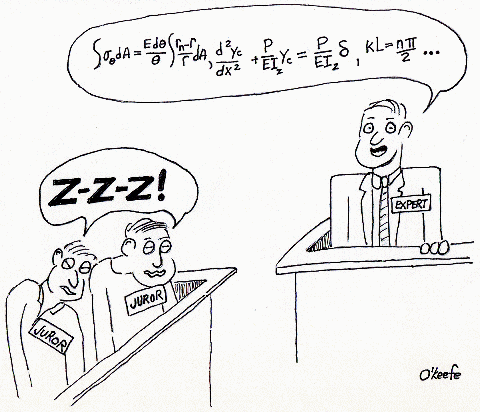When assessing that
statement it is correct in that the expert report is a major part of an expert
witness’s duty. However if a new expert witness is just relying on their expert
report then they may be in for a shock, as there are certain circumstances that
you can come unstuck. For example when I try to explain complex things to
people who have no knowledge of that area then it can become a real challenge,
if you use expert jargon and technical terms as the jury or judges can become
confused and struggle to follow your logic.

Another thing is how and when it is your time to expand on your reply and explain your reasoning, this can be a challenge for new witnesses as sometimes they are required to only answer in a yes or no format but can become frustrated when are told to respond to the question and that an explanation is not needed. Also barristers can use this against you as they can argue and challenge your opinions on unrelated topics. Barristers when cross-examining you will really capitalise on this and drill into you repeating the same question until they get under your skin and try to twist your words to prove their argument.
When giving evidence it can also become slightly biased whether through assumptions and conclusions that you have drawn earlier in the investigation can bias your results and give just one side of an opinion when answering questions. This can be a problem as your main duty is to give your expert opinion on the evidence and not to draw conclusions on it, as this biases your opinion and can get you into trouble as your opinion should be based on facts and not assumptions and conclusions you have drawn.
A lot of these
mistakes can be crucial ones, but are also learning points. If an expert
witness makes these mistakes during a case then it can have consequences
ranging from a warning from a judge up to not being allowed back into the court
room as an expert witness again. But prevention of these mistakes is the best
course of action, the most effect technique is to simply practice with colleagues
beforehand especially if it is your first time as confidence in your abilities
is key.
In conclusion these
present some really important mistakes that can affect an expert witness’s role
in the court; therefore I would definitely disagree with the statement as there
is more to giving evidence in court other than just relying on the expert report.
However most of these can be overcome with a lot of practice and becoming
confident in your own abilities and knowledge. Over time you become better at
being an expert witness and can learn from these mistakes. The most important
lesson that new expert witnesses need to learn are that they need to practice
beforehand and be confident and be themselves.
References
References
The Top Five Mistakes
Expert Witnesses Make - FindLaw. (2016). Findlaw. Retrieved 27 May 2016, from http://corporate.findlaw.com/litigation-disputes/the-top-five-mistakes-expert-witnesses-make.html


